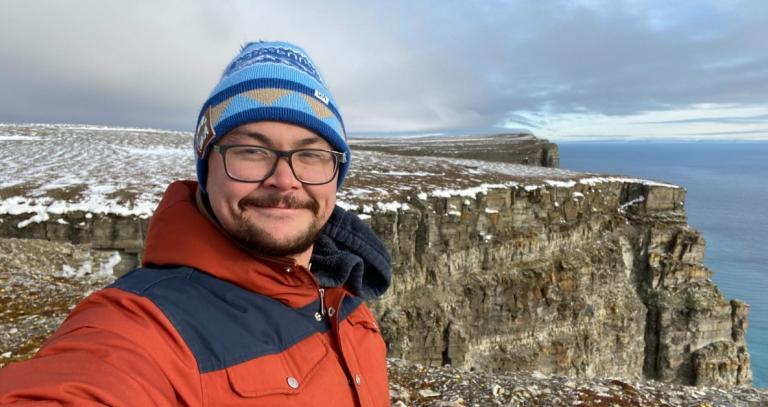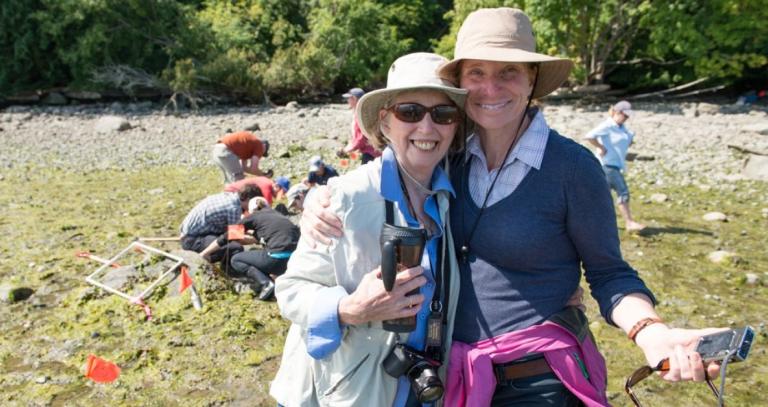Program description
You see climate change and biodiversity loss as the world’s most pressing social-ecological challenges. And you know that solving these wicked problems demands unprecedented collaboration across all sectors. You might be doing environmental work already, or feel compelled to join this rapidly growing field.
Either way, you want an efficient and flexible way to earn a Master's degree that will let you make a difference to your world, and promote a sustainable future for our planet.
The Master of Science in Environmental Practice will prepare you to advance in the rapidly growing range of environmental careers. You’ll follow an integrated science approach in your studies. You'll address social, natural and physical sciences. And you'll explore the cultural and humanities aspects of environmental problems.
As a Master of Science student, you'll focus on approaching environmental issues from a scientific foundation. And you’ll gain an understanding of sustainability and ecosystems, environmental risks and remediation techniques, and ways to manage sustainable development.
Flexible choices
This 30-credit program gives you flexibility to choose what you’ll learn, and when you’ll learn it. You’ll pick from many electives, to shape your current, or future, career path. And you can power through in two years, or take your time to finish in as many as seven. Or see what makes the most sense as you go.
It’s even flexible around where you’ll learn, because a fully online program lets you take classes from wherever in the world you are.
You can build from here
You can earn a Graduate Certificate in Science and Policy of Climate Change as part of your program. In addition, this program and the related Master of Arts in Environmental Practice are developed in partnership with ECO Canada (Environmental Careers Organization of Canada).
The Royal Roads University and ECO Canada partnership was established in response to the growing demand for environmental education that teaches applied, practical, industry-standard skills and prepares graduates for immediate entry to the workforce.
Through this strategic partnership, we are able to provide knowledge and skills training aligned to National Occupational Standards (NOS), and informed by Canada’s leading center for environmental labour market research.
Professional certification
Depending on your work experience and competency levels across NOS skill and knowledge domains, you may be eligible to apply for Environmental Professional certification upon graduation. As a nationally recognized designation that signifies professional excellence and integrity, EP certification follows the EP Code of Ethics and requires a commitment to continuing professional development and current practices. Explore the memberships & designations for new practitioners in the environmental sector.
Learn more about becoming an Environmental Professional.
Program outcomes
Once you have completed this program, you'll have skills in assessing environmental and climate impacts, developing and evaluating goals, objectives, and strategies for approaching environmental problems, and preparing, communicating and implementing action plans. You'll be ready to work in industries like governments, non-governmental organizations and the not-for-profit sector.
Program delivery
This program is delivered entirely online.
Online learning
Online courses consist of assigned readings, synchronous or asynchronous lectures, interactive discussions, and individual and team assignments.
You’re expected to meet deadlines and contribute meaningfully to your class. Your contributions are a big part of everyone’s learning.
You’ll take one online course at a time, each for a period of 10-12 weeks. Each online course requires approximately 10-15 hours of work per week.
You'll start your program with a non-credit, but required, course about academic integrity.
The Master of Science in Environmental Practice allows you to continue working while you learn, or to complete the program at your own pace. Some students finish in as few as two years, while others take the maximum seven years. Most take two to three years.
Course choices
You'll take three required courses in your program. You'll also choose electives from a set of courses offered at Royal Roads. Some of your electives may include the ones in our Graduate Certificate in Science and Policy of Climate Change. You can also take up to three electives offered by our partner institution, the University of Denver.
Completion options
You'll complete your degree by writing a research paper or completing a practicum.
Research paper option
A research paper lets you write an extensive paper on a topic you are interested in. This option is 6 credits, which means you will take one less elective than if you complete the practicum.
Practicum option
Take your learning out into the world, or to your own workplace, to gain practical experience with a practicum placement. You can work in an organization of your choice. This option is 3 credits, which leaves you room to take one more elective.
Work while you learn
Online courses allow you to learn without having to give up your current employment. While you'll want to check with your employer about your course schedule and any time off you might need, in many cases, employers can support and mentor you in your studies. Your employer may want to sponsor your research.
Courses
Non-Credit Required Course
All Royal Roads students are required to complete the ITAI: Introduction to Academic Integrity
ITAI
Introduction to Academic Integrity
0.0 Credits
Online
Required Core Courses
Students must complete the following two courses before taking other courses.
ENVP500
Developing a Sustainability Perspective
3.0 Credits
Online
ENVR550
Research and Analysis
3.0 Credits
On Campus, Online
Elective Courses
Students must take one of the CAPSTONE courses listed below (after completing 21 credits)
ENVP600 Practicum - select a total of 7 courses from the list of approved BLOCK A and BLOCK B electives
ENVP691 Research Paper - select a total of 6 courses from the list of approved BLOCK A and BLOCK B electives
Block A Elective Courses
Students taking ENVP600 must take a minimum of 2 Block A electives; students taking ENVP691 must take a minimum of one Block A elective.
ENVR582
Environmental Analysis and Remediation
3.0 Credits
Online
ENVR505
Ecosystem Science and Management
3.0 Credits
Online
ENVR581
Toxicology and Risk Assessment
3.0 Credits
Online
Block B Electives
EECO503
Foundations for Environmental Communication
3.0 Credits
Online
EECO586
The Biosphere and Sustainability
3.0 Credits
Blended, Online
PJMN501
Managing Complex Projects
3.0 Credits
On Campus, Online
ENVR545
Theories and Stories in Sustainable Development
3.0 Credits
Online
ENVR571
Legal Aspects of Environmental Management
3.0 Credits
On Campus, Online
SPCC614
Science and Impacts of Climate Change
3.0 Credits
Online
ENVR530
Economics for Decision Making
3.0 Credits
Online
SPCC615
Climate Policy and Governance
3.0 Credits
On Campus, Online
ENVR514
Global Environmental Processes and Current Issues
3.0 Credits
Online
ENVR560
Environmental Accounting and Reporting
3.0 Credits
Online
ENVR660
Environmental Management Tools
3.0 Credits
Online
SPCC616
Climate Solutions
3.0 Credits
Online
Block B Electives from University of Denver
Students can take a maximum of 3 University of Denver courses.
Registration information for these courses will be provided to students once registered in the program. Subject areas that may be available include:
- Endangered Species and Wildlife
- Renewable and Alternative Energies
- Climate Change and Science
- Nuclear and Hydrogen Energy
- Environmental Restoration & Waste Management
- Environmental Health and Safety
- Environmental Project Management
Capstone Courses
Students must complete ONE of the following (after completing 21 credits)
ENVP691
Research Paper in Environmental Practice
6.0 Credits
Directed, Field, Lab or Major Project
ENVP600
Practicum in Environmental Practice
3.0 Credits
Online
Faculty
Transfer agreements
Refine results
Standard admission
- Four-year (or comparable) undergraduate degree in a related field, with a minimum GPA of 'B' (3.00/4.33), from a recognized post-secondary institution.
- At least two years of relevant work or volunteer experience.
- Applicants who meet the degree requirement, but not the GPA requirement, will normally be required to complete "Academic Writing and Critical Thinking" several weeks prior to starting the program and obtain a minimum final grade of B (73%).
Flexible admission
Applicants who do not meet the Standard Admission requirements will be considered for flexible admission and assessed as follows:
- Normally, six years of relevant work experience, or an equivalent combination of education and experience.
- All flexible admission applicants will normally be required to complete "Academic Writing and Critical Thinking" several weeks prior to starting the program and obtain a minimum final grade of B (73%).
English language proficiency
- If English is not your primary language, please review our English language requirements.
Additional Recommendations
- This program is designed to be of most benefit to environmental practitioners who have an interest in, or a responsibility for, leadership in the context of sustainability. As such, work and volunteer experience are key elements considered for admission to the program. As a guideline, we suggest that each applicant should have at least three years of experience working with environmental issues.
All applications to this program require submission of the following information and supporting documents before your file can be assessed for admission:
Application form
In order to apply online, you will be required to create a log-in account using your email address. You will be required to list all credit courses and/or programs you have completed or are currently enrolled in. An application fee will be required. If your application fees are being paid by a third party, review sponsored student information. Once submitted, you may check the status of your application at any time.
Missed your application deadline? While we can’t make any guarantees, we may be able to accommodate late applications if there's still space and enough time to process. If you're interested in an intake that is now closed to applications, apply for the next available intake and email Admissions with your preferred start date. Make sure you’re prepared to submit your program's required documents right away. We can't make an admissions decision without them.
Official transcripts
Applicants are responsible for arranging for the submission of official transcripts from ALL post-secondary (higher education) institutions currently or previously attended, for all credit courses and/or programs. Transcripts are not required for non-credit programs or courses, though some programs may require proof of professional certifications or designations.
Transcripts are considered official only if submitted directly by the Registrar or other recognized authority of the providing institution in the institution's original, sealed envelope. If the envelope has been opened, the transcripts are no longer official and new (official) transcripts will be required to complete your application.
All international transcripts or credentials are subject to an international transcript and/or credential evaluation.
Letters of reference
It is ideal if one reference letter is based on your work experience and the other based on either your academic performance or community service that you have undertaken; however, two work-related references are acceptable in certain cases. There is no set standard format for letters of reference. The length and level of detail in each letter may vary.
Content of the reference letters should illustrate and support your suitability for admission to the Master of Arts/Master of Science in Environmental Practice program. Content may include how your referee feels you will succeed in the program (and why) and how the program will benefit you. Indication of demonstrated skills, competencies and aptitudes and other relevant information about which the referee can comment is beneficial. The context in which the referee has come to know you should also be mentioned.
Personal statement
Your personal statement should be no less than a one-page letter indicating your motivation for seeking entrance to the program. Your statement should comment upon your personal and career goals, the expectations you have for the program in relation to the achievement of your goals, and the strengths you feel you can bring to the program.
Detailed résumé
Your detailed résumé should include the following:
- Education: List all post secondary education, degrees, diplomas, and certificates you have achieved.
- Work experience: (You should expand on this point in case you wish to take advantage of Flexible Admission.)
- Voluntary/unpaid work experience: List and describe any voluntary/unpaid post-secondary employment and/or community service experience. Please include the name of the organization, length of service, and a brief description of duties. List positions you have held in this service. (You should expand on this point in case you wish to take advantage of Flexible Admissions.)
- Information technology training and experience: Briefly describe your level of training and experience in the use of information technology including computers, software and telecommunications networks as tools for business, education, teaching and personal use.
- Professional memberships/affiliations: List memberships and positions you hold/have held in professional associations, service clubs, community/volunteer sector.
- Other relevant information : Provide any other information which you believe is relevant to your application and will be of assistance to the review committee.
If applicable:
- Applicants declaring permanent resident or Convention Refugee status in Canada, must submit a copy of their Permanent Resident Card (PR card) along with their application.
- Transcript evaluation fee or credential evaluation report, if submitting international transcripts.
- An official English language proficiency score report or other evidence of proficiency if English is not your primary language.
- Other information or documents as may be requested to determine your eligibility.
For information on how and where to send your supporting documents, please refer to the document submission guidelines.
Financial aid and awards
Refine results
Tuition rates
Tuition rates for the Master of Science in Environmental Practice vary based on individual completion plans, course start dates and total course credits.
Search for tuition fees to find this year’s per-credit rates.
Please note: These rates are calculated for each course using a per-credit rate calculation.
Ancillary fees
Ancillary fees for this program include a one-time Student Services fee and an annual Self-Paced Program Administration fee. This fee covers the added costs of the self-paced program, including managing custom schedules and all letters of permission needed to take courses at other institutions.
Visit Ancillary fees to find the current rates.
Please note: Tuition and ancillary fees are subject to increase each year as of September 1.
Have a question about tuition and fees?
Contact Student Accounts for support.
The Environmental Careers Organization of Canada and Royal Roads University are the founders of the Canadian Centre for Environmental Education.
Housed at Royal Roads, the CCEE aims to provide advanced education, training and professional development tailored to the Canadian environmental sector, aligned with the National Occupational Standards for Environmental Employment.
The Master of Science in Environmental Practice is one of the programs we offer through the CCEE. Learn more about our formal partnerships with ECO Canada.


